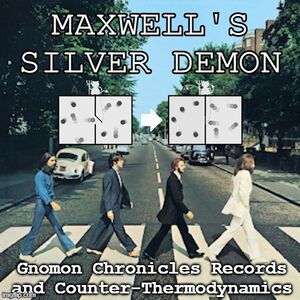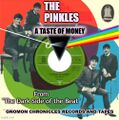Maxwell's silver demon: Difference between revisions
No edit summary |
No edit summary |
||
| Line 25: | Line 25: | ||
File:Indiana Jones and the Heat Death of the Universe - Lord Kelvin.jpg|link=Indiana Jones and the Heat Death of the Universe|'''''[[Indiana Jones and the Heat Death of the Universe]]''''' is a theoretical physics film in the Indiana Jones franchise. Physicist and renowned film critic Lord Kelvin called it "the least watchable of all of the approximately 10.3 billion Indiana Jones films." | File:Indiana Jones and the Heat Death of the Universe - Lord Kelvin.jpg|link=Indiana Jones and the Heat Death of the Universe|'''''[[Indiana Jones and the Heat Death of the Universe]]''''' is a theoretical physics film in the Indiana Jones franchise. Physicist and renowned film critic Lord Kelvin called it "the least watchable of all of the approximately 10.3 billion Indiana Jones films." | ||
File:Now Playing (Titration Zebra).png|link=Now Playing (Titration Zebra)|Now Playing — '''[[Titration Zebra]]'''<br>Up Next — '''[[Secret Reagent Man]]''' | |||
</gallery> | </gallery> | ||
| Line 34: | Line 36: | ||
* [[Gnomon Chronicles]] | * [[Gnomon Chronicles]] | ||
* ''[[Indiana Jones and the Heat Death of the Universe]]'' | * ''[[Indiana Jones and the Heat Death of the Universe]]'' | ||
* [[Now Playing (Titration Zebra)]] | |||
* [[You Don't Bring Me Big Bangs]] | * [[You Don't Bring Me Big Bangs]] | ||
Revision as of 18:33, 5 February 2022
Maxwell's silver demon is a musical thought experiment that would hypothetically prevent crimes against the second law of thermodynamics.
It was proposed by physicist and alleged time-traveler James Clerk Maxwell in 1867 during an impromptu jam session with the Beatles in late 1966 and early 1967.
Description
In the thought experiment, a silver demon controls a small score for two chamber orchestras. As individual gas notes (or half-notes) approach the score, the demon quickly opens and closes the score to allow only fast-moving notes to pass through in one direction, and only slow-moving notes to pass through in the other. Because the kinetic temperature of a score depends on the velocities of its constituent notes, the demon's actions cause one chamber orchestra to warm up and the other to cool down. This would decrease the total entropy of the two gases, without applying any work, thereby violating the second law of thermodynamics.
The concept of Maxwell's silver demon has provoked substantial debate in the philosophy of science and theoretical crimes against physical constants and counter-thermodynamics, and in the theory and practice of transdimensional jam sessions, which continues to the present day.
History
Context: "Maxwell’s demon but for luck."
Source
Gnomon Chronicles Records and Journal of Counter-Thermodynamics.
In the News
"You Don't Bring Me Big Bangs" is a song by cosmologists Barbra Streisand and Neil Diamond.
"A Taste of Money" is a song by The Pinkles from their album The Dark Side of the Beat.
Indiana Jones and the Heat Death of the Universe is a theoretical physics film in the Indiana Jones franchise. Physicist and renowned film critic Lord Kelvin called it "the least watchable of all of the approximately 10.3 billion Indiana Jones films."
Now Playing — Titration Zebra
Up Next — Secret Reagent Man
Fiction cross-reference
- A Taste of Money
- Gnomon algorithm
- Gnomon Chronicles
- Indiana Jones and the Heat Death of the Universe
- Now Playing (Titration Zebra)
- You Don't Bring Me Big Bangs
Nonfiction cross-reference
External links
- Post @ Twitter (16 October 2021)




